Trump says China knows ‘consequences’ of any attack on Taiwan
Sign up now: Get ST's newsletters delivered to your inbox

US President Donald Trump and Chinese President Xi Jinping talking as they leave after a bilateral meeting at Gimhae International Airport, South Korea, on the sidelines of the Apec summit.
PHOTO: AFP
Follow topic:
WEST PALM BEACH, Florida – US President Donald Trump said China knows the risks of any attack on Taiwan but refrained from explicitly saying the US would intervene militarily on behalf of the democracy of 23 million people.
Speaking in an interview that aired on Nov 2 with CBS’ 60 Minutes, Mr Trump said Chinese leader Xi Jinping “understands what will happen” if the People’s Liberation Army (PLA) tries to invade.
When pressed by host Norah O’Donnell on what that meant exactly, the US leader said: “I don’t want to give away, I can’t give away my secrets.”
He added that Mr Xi and other Chinese officials have said in meetings that they would never move against Taiwan while he was US president “because they know the consequences”, according to a CBS transcript of the interview.
The comments may provide some measure of reassurance to officials in Taipei that the US will continue to support Taiwan militarily in the face of Chinese aggression.
Mr Trump has caused concern in Taiwan by saying it had taken the US’ chip industry and should do much more to defend itself against the PLA, which has increased its activity around the archipelago in recent years.
Beijing views Taiwan as its territory that must be brought under its control some day, by force if necessary.
Taipei rejects those views, and President Lai Ching-te has made preparing the democracy for emergencies a priority since taking office in 2024.
To navigate the tensions with China over the issue, the US has long followed a policy of “strategic ambiguity”, in which Washington reserves the right to use force but does not explicitly say whether it would intervene.
The US has said Taiwan did not come up in talks
Mr Wen-ti Sung, non-resident fellow at the Atlantic Council’s Global China Hub, said that the topic was not raised is “a sign of low political trust between the US and China”.
“Striking any ‘grand bargain’, including Taiwan, will require (an) extremely high degree of political trust between the US and China,” he said.
“That simply does not exist, and it will be unlikely to develop under a transactionalist American administration.”
When asked about the trade deal reached with Mr Xi in South Korea, Mr Trump said that he had “always felt if we can make deals that are good, it’s better to get along with China than not”.
“I do think it’s important that China and the US get along, and we get along very well at the top,” he added.
When queried over whether he would allow Nvidia to sell its top semiconductors to the Asian nation, Mr Trump said: “No. No, we won’t do that.”
The US “will let them deal with Nvidia, but not in terms of the most advanced” chips.
Mr Trump suggested before the talks with Mr Xi that Nvidia’s top Blackwell semiconductor would be part of the discussions, but then later said the powerful artificial intelligence accelerator was not discussed.
Mr Trump did say China would talk to Nvidia and other companies about chips. BLOOMBERG

